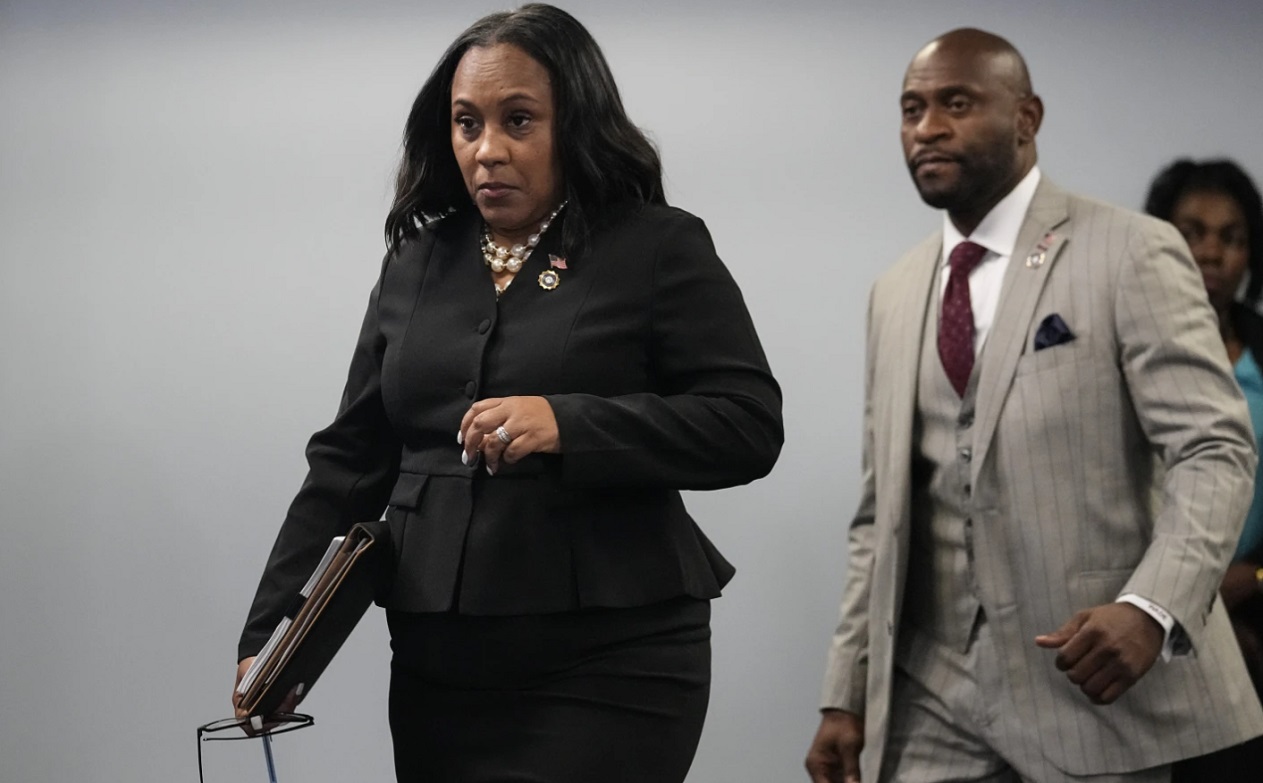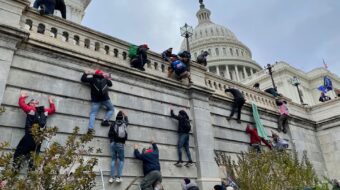
ATLANTA—An Atlanta grand jury indicted former Oval Office occupant Donald Trump and 18 others on racketeering and 40 other criminal counts for his scheme to steal Georgia’s electoral votes in 2020 in what amounted to an attempted coup against the constitution of the United States.
The charges mark the first time a one-time White House denizen has ever been indicted on a charge usually used against the Mob. Indeed, the counts—and the number of people, 18, indicted along with Trump—make the charges read as a description of the organized crime that they are.
“Every individual charged in the indictment is charged with one count violating Georgia’s Racketeering Influenced and Corrupt Organizations (RICO) Act, through participation in a criminal enterprise in Fulton County, Ga., and elsewhere,” Fulton County (Atlanta) District Attorney Fani Willis said.
The criminal enterprise’s “purpose was to allow Donald J. Trump to illegally seize the presidential term of office beginning Jan. 20th, 2021,” Willis said steadily and solemnly on August 14.
“Specifically, the participants took various actions to block the counting of the votes of the winners of Georgia’s 2020 presidential election.”
Trump and his conspirators both committed “overt acts” to block the votes and “predicate acts, which are acts of criminal activity” leading to racketeering, Willis said. Georgia has legal ways to challenge election results, but Trump and his racketeers ignored them and conducted their racketeering instead.
The grand jury, Willis said, issued arrest warrants to all 19 people charged with racketeering, including Trump. If convicted, each faces up to 20 years in jail, with no possibility of probation. Her office is “giving them the opportunity to voluntarily turn themselves in” by noon on August 25. Willis will seek to start the trial within six months but needs the judge’s OK for that.
Others charged
Besides Trump, the others charged with racketeering include his last chief of staff, Mark Meadows, his elections consigliere, former New York City Mayor Rudy Giuliani—whose law license is suspended—and other Trump attorneys, such as Ken Chesebro and Sidney Powell. Though Willis did not say so, Powell’s arguments for Trump’s schemes were so off-the-wall that even he called her “crazy.”
A notable key to the case is the infamous direct phone call from Trump to Georgia Secretary of State Brad Raffensperger, a Republican. Trump badgered Raffensperger to “find”—steal or concoct from thin air—the 11,780 popular votes Trump needed to carry the state by a single ballot. That “win” would then have given Trump Georgia’s 16 electoral votes.
In the testy—and recorded—45-minute conversation, Raffensperger flatly refused. The secretary, Georgia’s top elections official, said he would not violate his oath of office.
Trump’s call, in the racketeering case, makes clear that violating his oath of office, “to preserve, protect and defend the Constitution of the United States” was exactly what he schemed to do.
The call is part of the racketeering case because while Georgia’s RICO law is modeled on the federal law with the same name, it’s broader—which gives Willis wider latitude in prosecuting Trump.
Georgia law professors said its RICO lets prosecutors unite charges committed by different defendants without proving the existence of a criminal organization. And Willis said this indictment includes incidents in the same racketeering plan but carried out in other states by the Georgia case defendants. All were with the same aim, to illegally keep Trump in the White House.
That’s led Willis’s specially named racketeering prober, part of her team from the beginning of the investigation in 2021, to send staffers to discover details of what the Trump team did in the other six swing states, too: Pennsylvania, Michigan, Wisconsin, New Mexico, Arizona, and Nevada.
Giuliani faces 13 charges, including racketeering, conspiracy to commit impersonating a public officer, conspiracy to commit forgery in the first degree, and conspiracy to commit filing false documents and false statements.
Also indicted was right-wing California law professor John Eastman. He concocted another part of the racketeering: Naming fake electors in key swing states, including Georgia, whose certificates would either give Trump the White House again or throw the election’s outcome into doubt during the Jan. 6, 2021, vote count.
The grand jury also indicted Jeffrey Clark, a Justice Department Trump political appointee who eagerly accepted Trump’s plan to be named Acting Attorney General. Clark planned to send letters to states alleging “fraud” had occurred and not to count electoral votes for Democratic nominee Joe Biden, the actual winner. The letters were lies.
Trump backed down from naming Clark after the rest of the Justice Department’s top officers and U.S. attorneys all threatened to resign on the spot if Clark became their boss with the intent to carry out that election overturn plan.
Eastman’s fake electors scheme
Eastman’s “fake electors” scheme, which Trump embraced and urged on then-VP Mike Pence, is also part of the racketeering indictment. Pence, expected to be a key witness in Trump’s trials, refused to cooperate. Several of Georgia’s fake electors were among those indicted.
Pence wears his refusal—and his decision to stand by the U.S. Constitution–as a badge of honor on the campaign trail, despite thunderous boos and some threats from the Republican Trumpite majority. Both are campaigning for the 2024 Republican presidential nomination. Like other hopefuls, Pence trails Trump badly.
The indictment covers Trump’s steal-the-electoral vote schemes in at least Arizona and Pennsylvania, too, Reuters reported. It includes Giuliani’s lies while under oath in a public hearing, to Georgia state lawmakers saying fraud had occurred.
Another part of the racketeering was to urge Georgian state officials to violate their oaths of office by altering the election returns. Raffensperger bluntly refused.
The indictment also cited the breach of a voting system in a rural Georgia county and the harassment of an election worker. The worker, Ruby Freeman, and her mother, Wandrea “Shaye” Moss, became subject to Trumpite harassment and death threats.
The Georgia indictment is the fourth against Trump in five months. That includes two by U.S. Justice Department Special Counsel Jack Smith.
One indictment, in D.C., is of Trump alone for ordering, aiding and abetting the Jan. 6. 2021, Trumpite insurrection in the U.S. Capitol in a last desperate attempt to stop the count.
That’s the only indictment, so far, that directly ties Trump to his attempted coup d’état and invasion. The 1,000-plus invaders, hundreds of whom have since been convicted of seditious conspiracy, pillaged the historic building and pursued its occupants, who had to flee for their lives. Five defending police officers died afterwards from their injuries and 140-plus were badly hurt. Some had to retire on disability.
The other Trump indictment is in federal court in West Palm Beach, Fla., for illegally purloining top secret papers—including a Pentagon plan for war on Iran—from the White House. The judge in that case, Aileen Cannon, a Trump appointee, has set a tentative trial date in May, one news report said. Smith’s aiming for a Jan. 2, 2024, trial start in D.C.
If those dates and Willis’s proposed timeline stand, the coup d’état indictment would be at the start of the presidential primary season and the other two would be amidst it, though after Super Tuesday. The primary results could then show whether Republican primary voters are still in thrall to Trump.
But there will be two notable differences surrounding the Georgia indictment, compared to the others.
- The first is that Georgian court hearings are televised, while the others aren’t. That robs Trumpites of the claim that everything is a Democratic plot behind closed doors.
- The second is that because it’s a state indictment, not a federal one, the governor can’t pardon Trump, or anyone else, after a conviction, should one occur.
Nor can Trump, if he wins the White House again, pardon himself. Georgia’s governor has lacked pardoning power since the 1940s. Before that, governors sold pardons to jailed Ku Klux Klan members. Lawmakers responded by taking the pardon power away.
We hope you appreciated this article. At People’s World, we believe news and information should be free and accessible to all, but we need your help. Our journalism is free of corporate influence and paywalls because we are totally reader-supported. Only you, our readers and supporters, make this possible. If you enjoy reading People’s World and the stories we bring you, please support our work by donating or becoming a monthly sustainer today. Thank you!












Comments